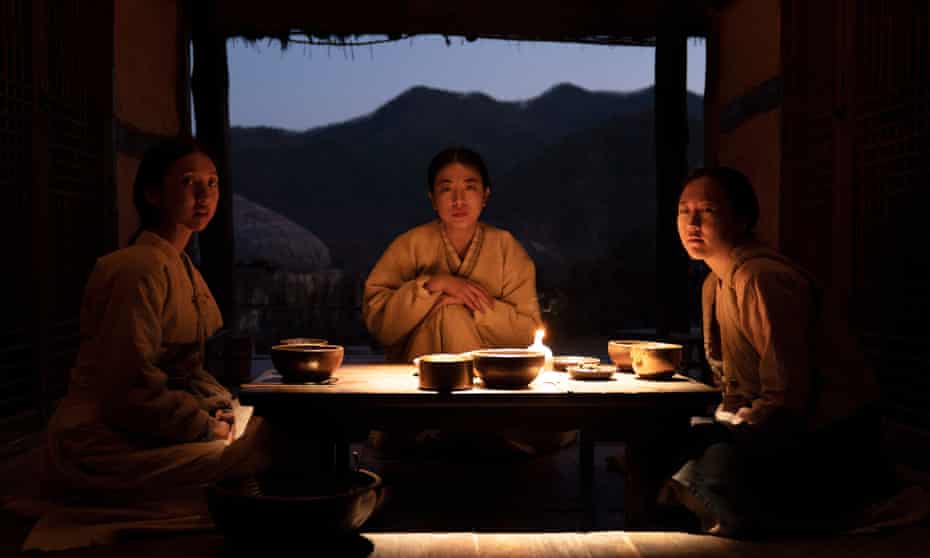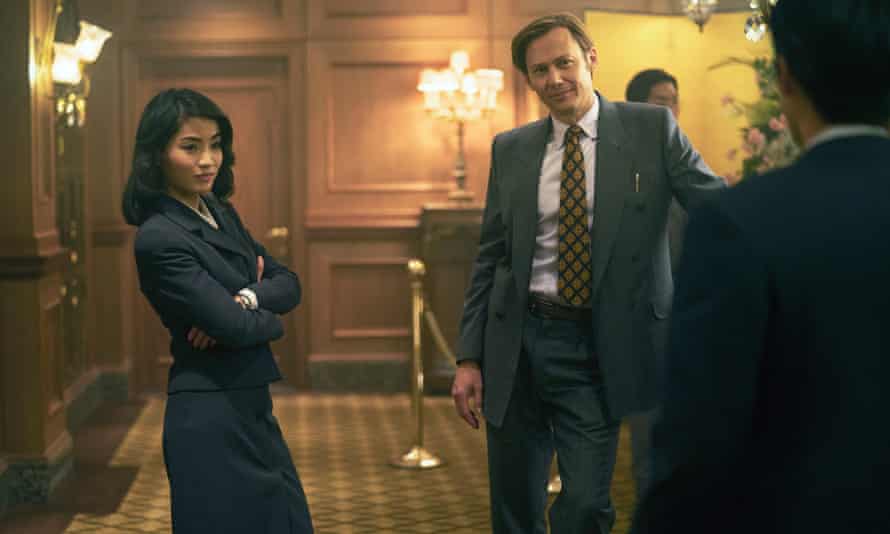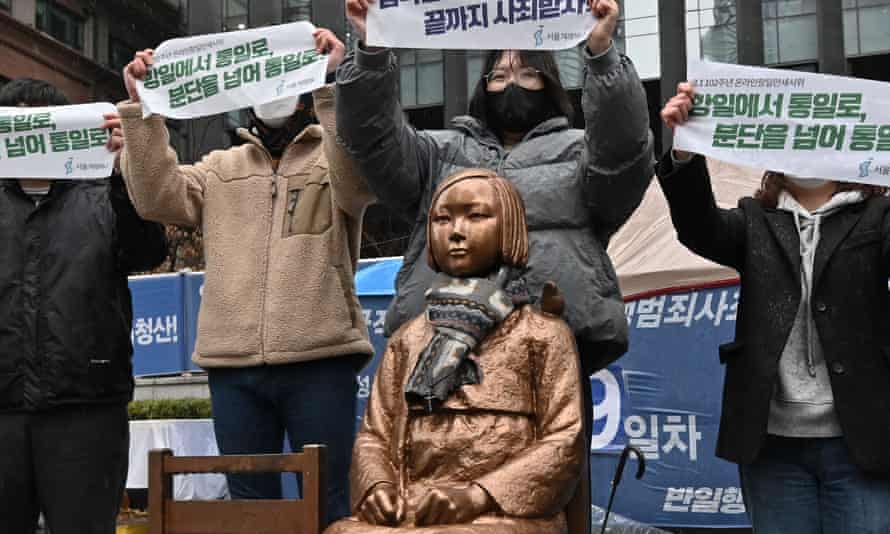Japan
‘A difficult time’: why popular TV series Pachinko was met with silence in Japan
Experiences of zainichi, brought over as labourers, highlights bitter historical legacy between South Korea and Japan that still lingers
 (From left) Inji Jeong, Yeji Yeon and Bomin Kim in Pachinko, an eight-part series on South Korean migrants that has won critical acclaim but encountered a quiet reception in Japan. Photograph: Juhan Noh/Apple TV+
(From left) Inji Jeong, Yeji Yeon and Bomin Kim in Pachinko, an eight-part series on South Korean migrants that has won critical acclaim but encountered a quiet reception in Japan. Photograph: Juhan Noh/Apple TV+
Justin McCurry in OsakaThu 21 Apr 2022 10.18 AEST
It has charmed critics and attracted big audiences in the UK and the US, but the TV adaptation of Min Jin Lee’s bestselling novel Pachinko has barely merited a mention in one of the countries that inspired it.
The eight-part drama, currently streaming on Apple TV+, evokes the universal migrant experience, but it is also an uncomfortable reminder of the bitter historical legacy of Japan’s colonial rule over the Korean peninsula.
The story of a family who leave Busan in South Korea for Osaka’s Korean quarter in the early 20th century, Pachinko’s narrative draws on the real-life experiences of the zainichi, the name for people of Korean descent who form one of Japan’s biggest ethnic minorities.
Kang Mijija’s family moved to Japan after the second world war, and encountered a country that offered opportunity, but at a price. As immigrants hailing from the Korean peninsula – freed from 35 years of Japanese colonial rule at the end of the second world war – they were easy targets for locals who despised their new neighbours.
“People threw water and even stones at my aunties,” Kang, a second-generation zainichi, told the Guardian at a café in Tsuruhashi, an Osaka neighbourhood with a large ethnic Korean community. “That was a really difficult time. Now we live in a grey zone … those extremes have gone, but there is still systemic discrimination and hate speech.”
Pachinko review – a sumptuous South Korean epic like nothing else on TV
Read more
Kang’s parents were first-generation zainichi – Japan’s 430,000-strong Korean diaspora, many of them the descendants of people forcibly brought to Japan as labourers before and during the second world war.
Just as Pachinko – named after the pinball-like gaming machine that has given many ethnic Koreans a livelihood– appeared last month, audiences in Japan were confronted with another chapter in their country’s troubled relationship with its neighbour.
 Anna Sawai and Jimmi Simpson in Pachinko. Photograph: Juhan Noh/Apple TV+
Anna Sawai and Jimmi Simpson in Pachinko. Photograph: Juhan Noh/Apple TV+Shusenjo, a documentary by director Miki Dezaki, examines the controversy over the “comfort women” – an estimated tens of thousands of women and girls, mainly from the Korean peninsula, who were coerced into working in Japanese military brothels before and during the second world war.
Dezaki, who recently took his documentary around Japan and to the US, had to fight off a legal challenge from right-wing commentators who claimed they had not given their consent to appear in the film. “The right-wing nationalist view of the comfort women issue is now the mainstream narrative in Japan,” he says.
Under its longest-serving prime minister, Shinzo Abe, Japan set about dismantling its “masochism” over the war, casting doubt on accepted narratives about the Japanese military’s role in recruiting comfort women and the use of zainichi as forced labour.
“This accelerated the overall intolerant atmosphere in Japanese society,” says Satoko Oka Norimatsu, a co-coordinator of the International Network of Museums for Peace. “Japanese people do not think racism exists in Japan, and they do not like to face up to the fact that they are active perpetrators of racism against the zainichi.”
Dezaki noted how little coverage his legal victory had attracted, even in Japan’s liberal media. “Unless Japanese news media, especially TV news media, cover my film or Pachinko, there will be no balance,” he said.
The balance has tipped in favour of conservative, revisionist interpretations of history. Japan has pushed bids for Unesco world heritage status for sites that used Korean workers. Under government pressure, school textbooks that will be introduced next year omit the word “forced” to describe wartime labourers and make no mention of the military’s role in recruiting comfort women.
 South Korean protesters hold up banners beside a statue of a teenage girl symbolising ‘comfort women’ near the Japanese embassy in Seoul in March 2021. Photograph: Jung Yeon-Je/AFP/Getty Images
South Korean protesters hold up banners beside a statue of a teenage girl symbolising ‘comfort women’ near the Japanese embassy in Seoul in March 2021. Photograph: Jung Yeon-Je/AFP/Getty ImagesWhile legal crackdowns on hate speech have weakened far-right groups such as Zaitokukai, which calls for the removal of supposed “privileges” for ethnic Koreans, there are no penalties for violators, and much of the abuse has migrated online.
Few believe the films – along with a recent freedom of speech exhibition in Tokyo that included a statue symbolising the comfort women – will be enough to rein in rightwing narratives about the zainichi and Japan’s wartime conduct.
“I don’t think the far right is going to shut up anytime soon,” says Bang Chungja, a second-generation zainichi Korean who belongs to an Osaka-based network demanding compensation and an official apology for victims of wartime sexual slavery. “Japan should recognise the truth of history … Japanese people suffered terribly in the war too, but they were not the only victims.”
The Japanese consulate in Lyon reportedly tried to prevent Shusenjo from being shown at the city’s Institut d’Etudes Politiques, while Japanese officials have backed campaigns for the removal of comfort women statues in the US and Germany.
“It’s good that people who watched the film may become interested in the issue of the comfort women, but their supporters are losing the fight in Japan,” says Tomomi Yamaguchi, an associate professor of anthropology at Montana State University.
“The Japanese government and the mainstream media have taken the stance that Japan is not responsible for sexual slavery [during the war]. While younger people may be interested in Korean pop culture, mainstream Japanese society is stuck in a revisionist version of history.”
Kang, though, was cautiously optimistic that Pachinko and Shusenjo could raise awareness of the Korean experience in Japan. “I think Min Jin Lee intended to tell our story to the entire world, and it’s good that people are learning about the zainichi.”
No comments:
Post a Comment